10 Strategies to Overcome Siloed Data for Analysts

10 Strategies to Overcome Siloed Data for Analysts
Introduction
Overcoming siloed data presents a significant challenge for organizations aiming for effective decision-making and innovation. Analysts often navigate a fragmented landscape of information, which can impede their ability to extract valuable insights. This article delves into ten strategic approaches designed to dismantle these barriers, enhance data accessibility, and foster a collaborative culture.
How can organizations leverage these strategies to streamline their data processes and unlock the full potential of their analytical capabilities? By addressing these issues, organizations can not only improve their data management but also drive innovation and informed decision-making.
Consider the implications of these strategies: they can transform how teams collaborate and share information, ultimately leading to more cohesive and effective outcomes. As we explore these approaches, think about how they might apply to your own organization and the potential benefits they could bring.
Initial Data Offering: Centralize Your Data Marketplace
The Initial Data Offering (IDO) is a crucial marketplace that simplifies the launch and discovery of new datasets. By centralizing information resources, IDO enhances accessibility to a diverse range of datasets and reduces the challenges posed by siloed data, including alternative information, fundamentals, and ESG data. This centralization not only boosts visibility but also cultivates a vibrant community of information buyers and sellers, helping organizations to address the issues of siloed data in order to find the necessary data for informed decision-making.
As we look ahead to 2025, the trend toward centralized information marketplaces is gaining traction. Organizations are increasingly recognizing the value of integrated solutions in addressing the issues caused by siloed data. Analysts benefit from these platforms, as they provide a comprehensive view of available datasets, allowing for more efficient extraction of actionable insights. Industry specialists emphasize that a centralized information platform can transform how analysts operate, enabling them to focus on analysis rather than information retrieval. This shift is vital, especially considering that professionals often spend 60% to 80% of their time searching for information.
Successful examples of information marketplace platforms demonstrate the effectiveness of this model. By utilizing centralized systems, organizations can minimize siloed data, which enhances their data-driven strategies and leads to better decision-making and innovation. IDO's commitment to quality and community engagement positions it as a leader in this evolving landscape, empowering users to fully leverage their information capabilities.
How can your organization benefit from the centralized approach of IDO? Consider the potential for improved efficiency and insight generation in your data analysis processes.
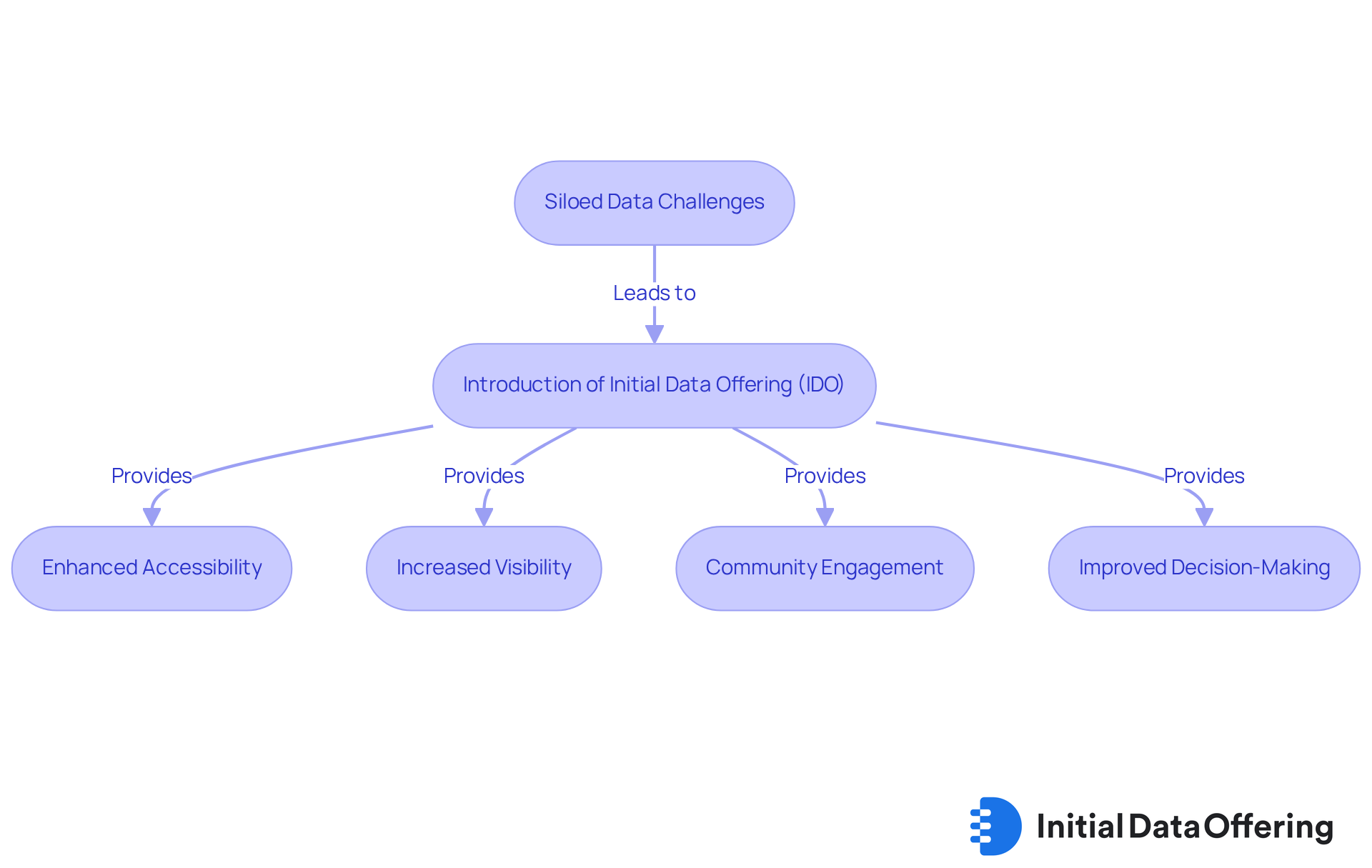
Implement Effective Data Governance Strategies
Implementing effective information governance strategies is crucial for organizations aiming to manage their information efficiently. This involves establishing clear policies and procedures for information management, which includes:
- Defining ownership of information
- Ensuring compliance with regulations
- Maintaining quality standards
A well-defined governance framework is essential. It outlines roles and responsibilities, enabling teams to collaborate effectively while safeguarding information integrity. By doing so, organizations not only protect their data but also enhance operational efficiency.
Have you considered how a robust governance framework could impact your organization? For instance, organizations that prioritize information governance often see:
- Improved compliance rates
- Reduced risks associated with data breaches
In summary, effective information governance strategies not only streamline processes but also foster a culture of accountability and trust within the organization.

Promote Data Literacy and Collaborative Culture
Encouraging information literacy within a company is essential for equipping staff to understand and utilize information effectively. This can be achieved through targeted workshops, comprehensive resources, and ongoing support. A collaborative culture plays a pivotal role in this process, fostering an environment where teams can share insights and work together on information-driven projects. Such an atmosphere not only values information but also promotes its use across all levels of the organization.
Industry leaders emphasize the importance of cultivating a collaborative information culture. For instance, Miro Kazakoff points out that in a data-rich world, companies with more data-literate employees are better positioned for success. Geoffrey Moore reinforces this notion, stating that information is crucial for making informed decisions, allowing organizations to learn from past performance and anticipate future trends.
The current trend of promoting information literacy in the workplace is gaining momentum, with organizations recognizing its impact on productivity and decision-making accuracy. Companies that invest in information literacy training can expect significant returns; for every dollar spent, they can see a return of $44 through enhanced performance and smarter decisions. This investment is particularly beneficial for market research analysts, who rely on accurate information interpretation to drive strategic insights.
Moreover, a collaborative culture enhances information utilization by breaking down siloed data and fostering teamwork. Organizations that prioritize collaboration often experience improved information sharing and innovation. For example, companies that have adopted collaborative practices report increased efficiency in data-driven projects, resulting in better outcomes and a more agile response to market changes. By emphasizing information literacy and teamwork, organizations can prevent siloed data and create a robust framework for effectively leveraging insights, ultimately fostering growth and a competitive edge.

Leverage Technological Solutions for Data Integration
Employing technological solutions like information integration platforms and APIs is essential for improving accessibility across organizations. These tools facilitate the seamless flow of information between diverse systems, allowing businesses to integrate data from various sources effectively. For instance, organizations such as Unilever have successfully adopted master information management solutions to simplify vendor onboarding procedures, leading to centralized information points and enhanced operational efficiency.
As we look ahead to 2025, the landscape of information integration continues to evolve. Organizations increasingly recognize the need for robust integration strategies. A notable trend is the adoption of decentralized information mesh architectures, as seen with JPMorgan Chase, which enhances tracking and cross-enterprise visibility. This shift not only improves information management but also fosters a culture of cooperation among teams.
The benefits of utilizing integration platforms are numerous. They streamline business procedures, minimize manual data entry, and enhance decision-making by offering a unified perspective of information. Furthermore, integrated data supports regulatory adherence by ensuring that organizations maintain precise and verifiable records. In fact, information integration is crucial for ensuring regulatory compliance, providing accurate, consistent, and auditable information—essential in industries with strict governance regulations.
As emphasized by industry specialists, APIs play a crucial role in enhancing information accessibility. They enable real-time data synchronization, ensuring that any changes in source systems are promptly reflected in target systems. This capability is vital for entities aiming to provide timely insights and improve customer experiences. Notably, 51% of B2B buyers cited poor integration with their existing tech stack as a reason to explore new vendors, highlighting the importance of integration in vendor selection.
In summary, adopting contemporary information integration technologies is not merely a trend but a necessity for organizations looking to overcome siloed data and enhance operational efficiency. By investing in these solutions, businesses can unlock the full potential of their information, leading to better-informed decisions and improved strategic planning.
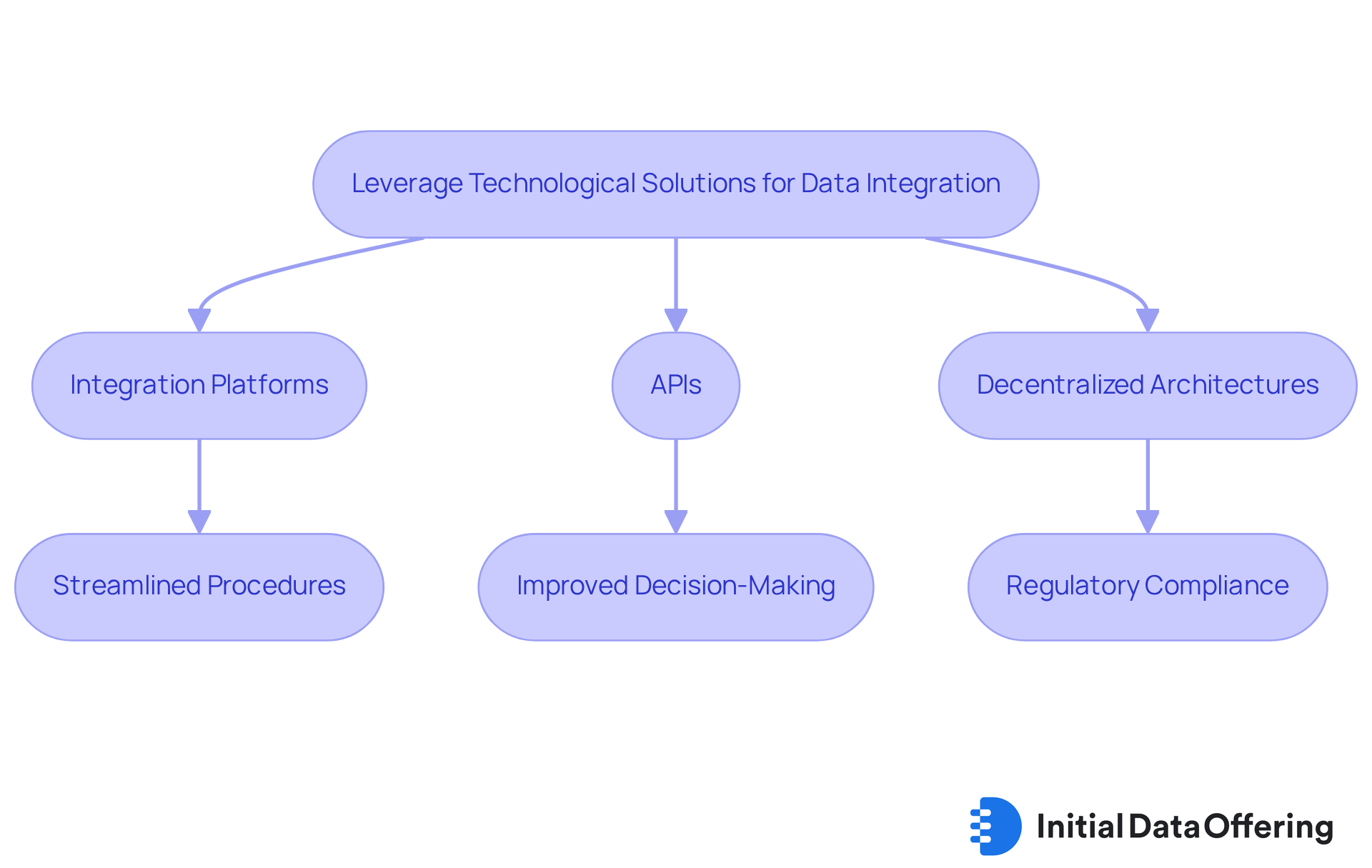
Centralize Data Storage for Enhanced Accessibility
Centralizing information storage is a strategic move that involves consolidating all datasets into a single repository to eliminate siloed data. This approach not only enhances accessibility but also reduces redundancy that often arises from siloed data. By overcoming siloed data, organizations can provide a unified view of information to facilitate improved analysis and decision-making.
Consider the advantages of this method: it allows users to retrieve information quickly and efficiently, which is crucial in today’s fast-paced environment. Cloud-based solutions, in particular, offer scalability and security, ensuring that data is not only safe but also easily accessible. How might your organization benefit from such a system?
The benefits are clear: by overcoming siloed data, teams can collaborate more effectively, leading to better outcomes. Organizations should explore these solutions to enhance their operational efficiency and decision-making capabilities. By investing in a centralized information storage system, you’re not just improving access; you’re paving the way for smarter, data-driven decisions.

Encourage Data Sharing and Team Collaboration
Nurturing a cooperative atmosphere hinges on promoting information exchange among teams. Organizations must adopt tools and platforms that simplify information access and enhance communication across departments. By dismantling siloed data, teams can harness diverse insights, which drives innovation and significantly improves overall performance.
Current trends underscore the increasing reliance on collaboration tools. For instance, 76% of the global workforce utilizes video conferencing and project management software to facilitate teamwork. These tools not only improve communication but also offer integrated solutions for managing projects efficiently, enabling teams to share insights effortlessly.
As Richard Branson aptly stated, "Success in business is all about people, people, people. Whatever industry a company is in, its employees are its biggest competitive advantage." This highlights the necessity of collaboration in maximizing the potential of siloed data. By leveraging tools like ProofHub and Zoom, which provide features for task management and real-time communication, organizations can foster a culture of openness and shared knowledge.
To further enhance collaboration, teams should explore these tools. Consider implementing regular check-ins to ensure alignment and foster a collaborative spirit. How can your team benefit from these practices? Ultimately, this approach leads to better decision-making and enhanced productivity.

Utilize Cloud Services and NoSQL Databases
Leveraging cloud services alongside NoSQL databases allows organizations to effectively manage large volumes of unstructured and semi-structured data. These technologies provide essential scalability and flexibility, enabling businesses to adapt to evolving information needs. By adopting cloud-based solutions, companies can ensure data accessibility from anywhere, which significantly enhances remote work capabilities and promotes collaboration among teams.
This approach not only simplifies data management but also helps to overcome challenges related to siloed data, encouraging innovative workflows that are crucial in today’s fast-paced work environment. As more organizations adopt NoSQL databases, they are discovering significant advantages in handling diverse data types, which is vital for maintaining a competitive edge in an information-driven landscape.
To enhance their data strategies, organizations should consider high-quality datasets available through platforms like Initial Data Offering. How can these datasets transform your operations? By integrating such resources, businesses can unlock new insights and drive efficiency, ultimately leading to better decision-making and improved outcomes.
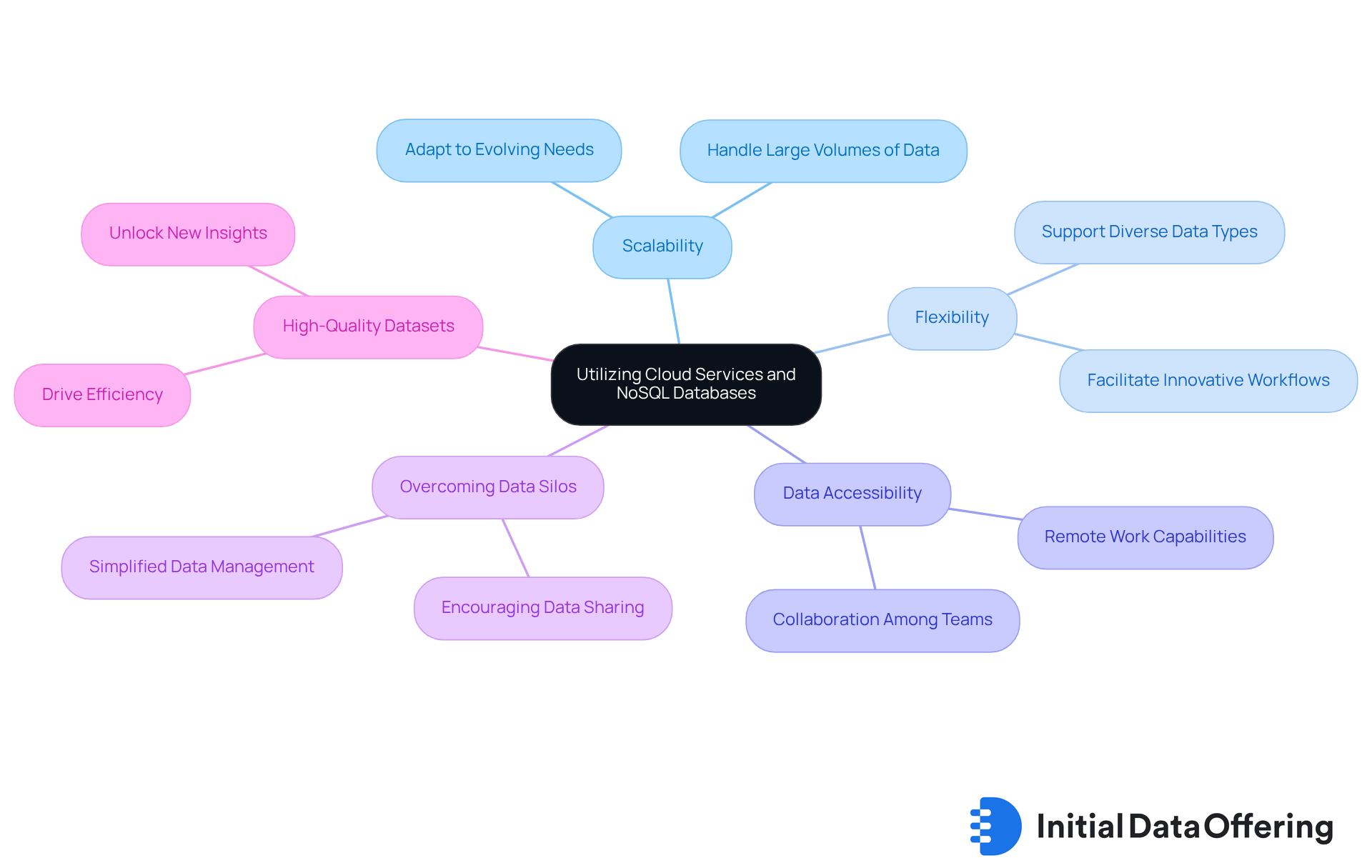
Foster a Data-Driven Organizational Culture
Fostering an evidence-based organizational culture is essential for integrating information into decision-making processes at every level. This approach not only enhances strategic planning but also influences everyday operations. Leaders play a crucial role in this transformation by promoting the use of information, motivating staff to prioritize insights over instinct. This cultural shift creates an environment where information is actively appreciated, leading to greater agility and responsiveness to market dynamics.
As Geoffrey Moore aptly stated, "Without extensive information, you are blind and deaf and in the middle of a freeway." This highlights the necessity of insights in navigating today’s complex business landscape. Ronald Coase further emphasized the importance of proper information handling with his remark, "Torture the information, and it will confess to anything." Organizations that effectively incorporate information into their decision-making processes often see significant improvements in efficiency and competitiveness.
For instance, businesses in the financial services industry achieve an average ROI of 30%, while healthcare entities report an impressive 124% ROI from efficient information integration. In contrast, companies lose an average of $9.7-15 million annually due to quality issues, underscoring the financial consequences of ineffective information use. By focusing on evidence-based decision-making, leaders can unlock valuable insights that drive innovation and strategic growth.
How can your organization leverage these insights to enhance its decision-making processes?
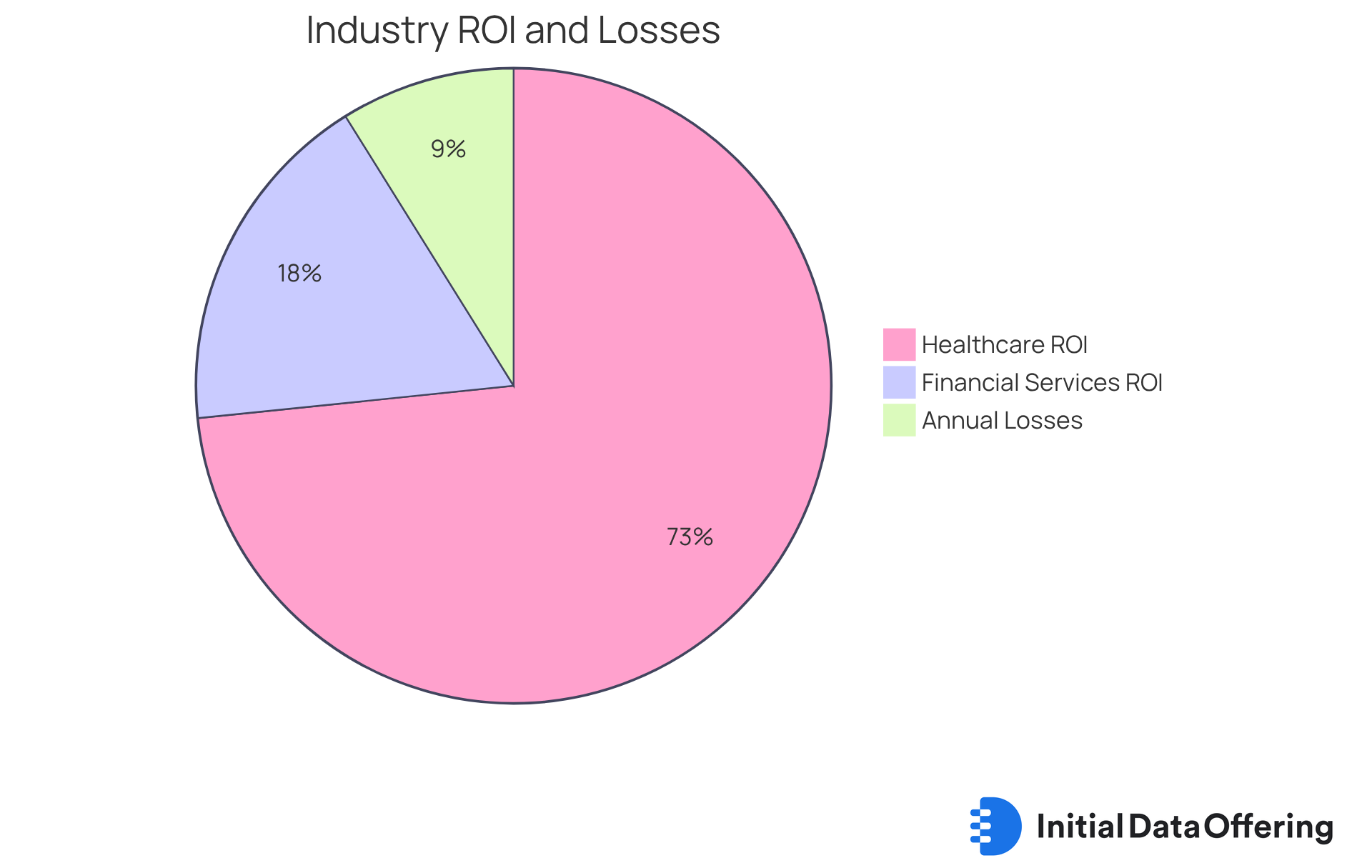
Cultivate Leadership Support for Data Accessibility
Effective leadership plays a crucial role in fostering a culture of information accessibility, which is essential for addressing the challenges posed by siloed data in information-related initiatives. Leaders must actively promote evidence-based practices and strategically allocate resources to enhance information management capabilities, particularly to overcome issues related to siloed data. By demonstrating a strong commitment to information accessibility, leadership not only inspires teams to adopt evidence-based decision-making but also combats the issues arising from siloed data, nurturing an environment of openness and collaboration.
Consider companies like Google and Amazon. For instance, Amazon leverages information extensively to optimize its supply chain, resulting in significant competitive advantages. Industry specialists emphasize that organizations prioritizing information accessibility and investing in the right tools can expect notable improvements in efficiency and innovation, especially by avoiding siloed data. Furthermore, robust leadership support can greatly enhance the effectiveness of information-based practices, ensuring that siloed data is not only collected but also effectively utilized to facilitate informed decisions at all organizational levels.
However, leaders face challenges, such as a lack of technical skills affecting up to 90% of firms, which can hinder the implementation of analytics-based strategies. To address these obstacles, leaders should encourage team members to pose evidence-based questions, fostering a culture that values insights.
How can your organization benefit from prioritizing information accessibility? By embracing these practices, you can drive efficiency and innovation within your teams.
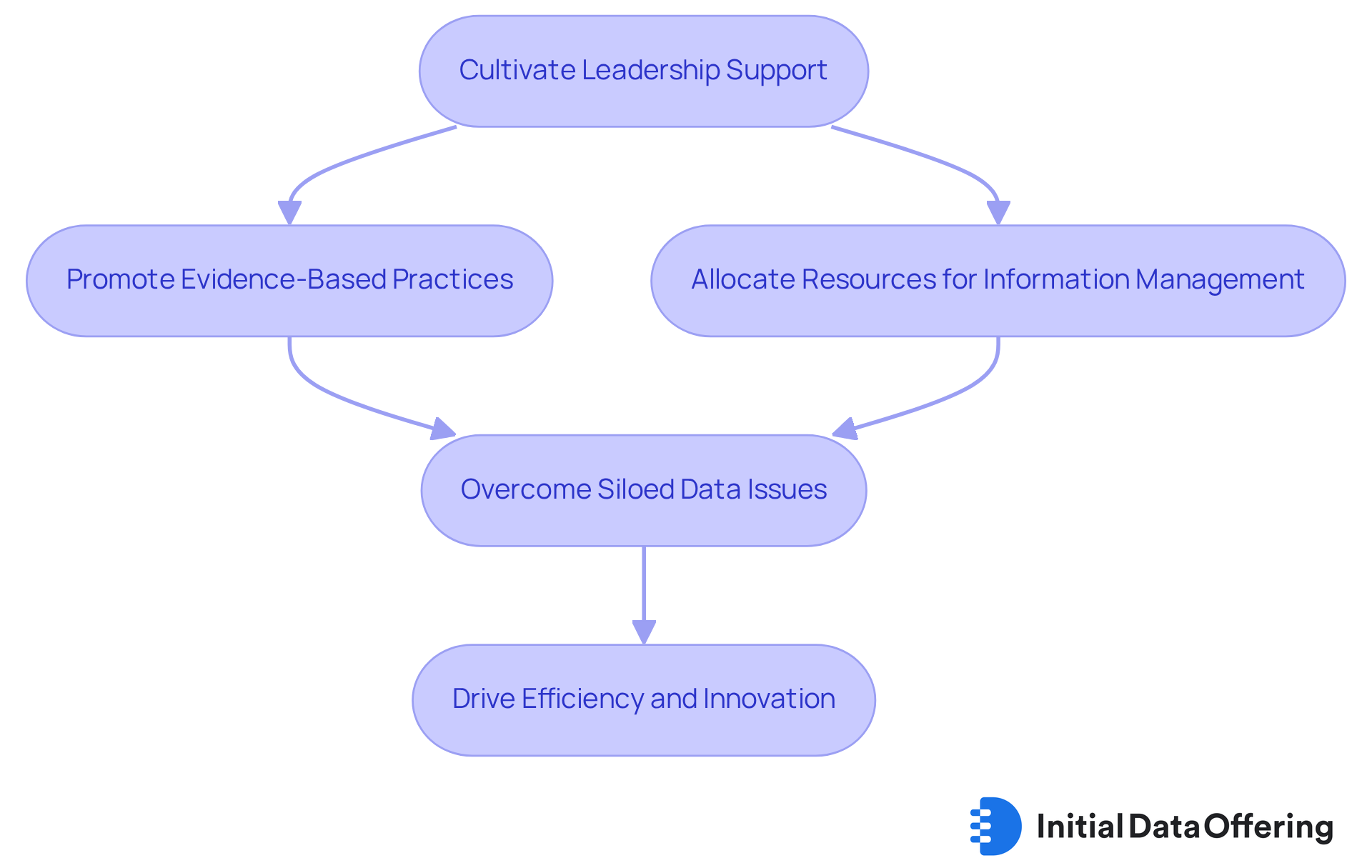
Implement ETL Processes for Seamless Data Connectivity
Implementing ETL (Extract, Transform, Load) processes is essential for achieving seamless connectivity across diverse systems. ETL enables organizations to consolidate information from various sources, transforming it into a uniform format ready for analysis. This organized approach not only enhances information quality but also significantly reduces redundancy, ensuring decision-makers have access to accurate and timely insights.
Current trends show that cloud-based ETL tools are gaining traction, capturing a market share of 65% with a projected growth rate of 15.22%. These tools automate information processing and facilitate real-time loading into repositories, streamlining workflows and boosting efficiency. Organizations that adopt ETL workflows often report a three-year ROI averaging between 271% and 299%, with many achieving positive returns within just six months. How can your organization leverage these tools for better outcomes?
Successful ETL implementations demonstrate how robust workflows can enhance information connectivity. For example, companies using ETL tools have effectively combined various information sources, leading to improved analytics capabilities and informed decision-making. As industry specialists note, "ETL remains a fundamental process for information management and is unlikely to disappear anytime soon," underscoring its enduring importance in the evolving information landscape. By prioritizing ETL processes, organizations can ensure their data is not only accessible but also reliable, ultimately driving better business outcomes.
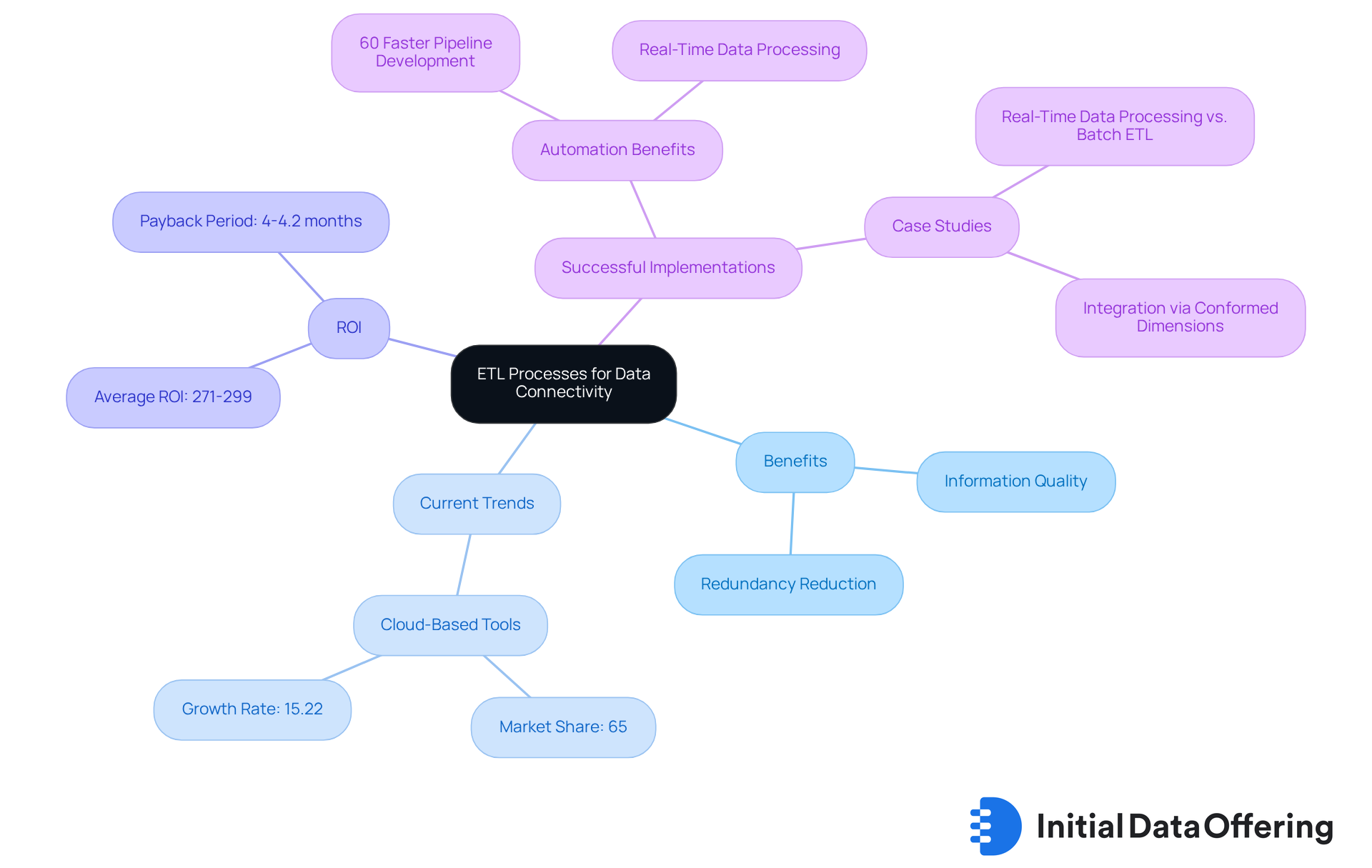
Conclusion
Overcoming siloed data is crucial for organizations aiming to boost their analytical capabilities and make informed decisions. Centralizing data, implementing effective governance, promoting data literacy, and fostering collaboration are key strategies that can help achieve this goal. By tackling these challenges, companies can fully harness their data's potential, resulting in enhanced efficiency and innovation.
Key insights from the article underscore the importance of adopting centralized data marketplaces and establishing robust governance frameworks. Leveraging technological solutions for seamless data integration is also vital. Moreover, cultivating a culture of collaboration and data-driven decision-making is essential for organizations that want to excel in today’s data-centric landscape. These strategies not only reduce the risks tied to siloed data but also empower teams to share insights and drive better outcomes.
Ultimately, breaking down data silos demands a united effort from both leadership and employees. By prioritizing data accessibility and investing in the right tools and practices, organizations can create an environment that values information and enhances decision-making capabilities. Embracing these strategies will lead to improved operational efficiency and position companies for long-term success in a competitive marketplace.
Frequently Asked Questions
What is the Initial Data Offering (IDO)?
The Initial Data Offering (IDO) is a centralized marketplace that simplifies the launch and discovery of new datasets, enhancing accessibility and reducing challenges associated with siloed data.
How does IDO address the issues of siloed data?
IDO centralizes information resources, which boosts visibility and cultivates a community of information buyers and sellers, helping organizations find necessary data for informed decision-making.
What benefits do analysts gain from using centralized information platforms like IDO?
Analysts benefit from a comprehensive view of available datasets, allowing for efficient extraction of actionable insights and enabling them to focus more on analysis rather than information retrieval.
What impact does a centralized information platform have on decision-making?
A centralized information platform minimizes siloed data, enhances data-driven strategies, and leads to better decision-making and innovation.
What are the key components of effective information governance strategies?
Effective information governance strategies include defining ownership of information, ensuring compliance with regulations, and maintaining quality standards.
Why is a well-defined governance framework important for organizations?
A well-defined governance framework outlines roles and responsibilities, enabling effective collaboration and safeguarding information integrity, which enhances operational efficiency.
How can promoting data literacy benefit an organization?
Promoting data literacy equips staff to understand and utilize information effectively, leading to improved productivity and decision-making accuracy.
What role does a collaborative culture play in information utilization?
A collaborative culture fosters an environment where teams can share insights and work together on information-driven projects, breaking down siloed data and enhancing information sharing and innovation.
What are the financial benefits of investing in information literacy training?
Organizations that invest in information literacy training can expect significant returns, with a reported return of $44 for every dollar spent through enhanced performance and smarter decisions.
How can organizations prevent siloed data and leverage insights effectively?
By emphasizing information literacy and teamwork, organizations can create a robust framework for effectively leveraging insights, fostering growth and maintaining a competitive edge.